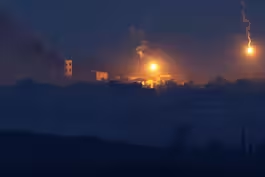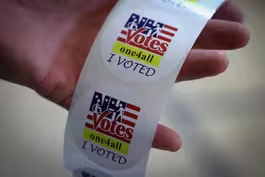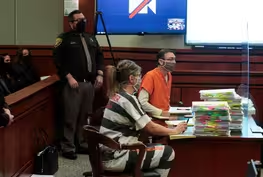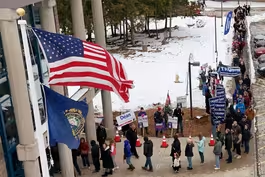
UN’s top humanitarian official discusses crisis in Gaza
Clip: 1/23/2024 | 8m 31sVideo has Closed Captions
UN’s top humanitarian official discusses crisis in Gaza
The U.N. says 1.7 million of Gaza’s 2.2 million residents are currently displaced. To discuss the humanitarian situation in Gaza and other humanitarian crises across the world, Nick Schifrin spoke with Martin Griffiths, the U.N.'s Under-Secretary-General for Humanitarian Affairs and Emergency Relief Coordinator.
Problems playing video? | Closed Captioning Feedback
Problems playing video? | Closed Captioning Feedback
Major corporate funding for the PBS News Hour is provided by BDO, BNSF, Consumer Cellular, American Cruise Lines, and Raymond James. Funding for the PBS NewsHour Weekend is provided by...

UN’s top humanitarian official discusses crisis in Gaza
Clip: 1/23/2024 | 8m 31sVideo has Closed Captions
The U.N. says 1.7 million of Gaza’s 2.2 million residents are currently displaced. To discuss the humanitarian situation in Gaza and other humanitarian crises across the world, Nick Schifrin spoke with Martin Griffiths, the U.N.'s Under-Secretary-General for Humanitarian Affairs and Emergency Relief Coordinator.
Problems playing video? | Closed Captioning Feedback
How to Watch PBS News Hour
PBS News Hour is available to stream on pbs.org and the free PBS App, available on iPhone, Apple TV, Android TV, Android smartphones, Amazon Fire TV, Amazon Fire Tablet, Roku, Samsung Smart TV, and Vizio.
Providing Support for PBS.org
Learn Moreabout PBS online sponsorshipTo discuss the humanitarian situation in Gaza,## but also other humanitarian crises around# the wo the U.N. undersecretary-general for humanitarian# affairs and emergency relief coordinator.
Martin Griffiths, thanks very much.# Welcome back to the "NewsHour."
Let's start in Gaza.
The WFP said today that# very lit and Northern Gaza and that there is still# a risk of famine.
How serious is that risk?
MARTIN GRIFFITHS, U.N. Undersecretary-General for## And what's quite striking in Gaza if you compare it to other parts of# the world.
We estimate maybe 400,000 people## are seriously at risk of famine.
Moving aid# around in Gaza is, in all practical terms,## impossible.
Getting food to these people since# up October the 7th has been very, very difficult.
It's a very, very rapid# decline and it's very worrying.
NICK SCHIFRIN: Today, the Israeli# government spokesman Eylon Levy said## that there are -- quote -- "no limitations# on humanitarian aid," and he adde EYLON LEVY, Israeli Government Spokesman: It# is lamentable that U.N. officials who have also## been covering up for the fact that Hamas hijacks# aid and co war out of hospitals are trying to cover up# their own systemic failure by demanding the## opening of new entry routes, when there is already# adequate and excess capacity at the existing ones.
NICK SCHIFRIN: What's your# response to that statement?
MARTIN GRIFFITHS: I think it's extremel think it's wrong to suggest that# we don't need more entry p But, most importantly, if the conditions# inside Gaza, the operational conditions,## don't exist for the distribution of aid,# don't blame us for that.
They result from## the conflict.
And they include safety of# movement.
They include roads which are## not mined.
They include assurances that places# that we will deliver aid to won't be attacked.
They include hospitals that are not places# of war.
They include not taking out of our## trucks when they're being screened on the# way in.
So I don't think it's right to## blame humanitarian agencies for what is# a very, very, very difficult operation.
NICK SCHIFRIN: You mentioned hospitals.
Hamas# operates near hospitals and has fired rockets## near hospitals.
The U.S. and Israel accuses# Hamas of using hospitals as command-and-control.
And, in Southern Gaza, just in the last# few days, we have seen Israeli forces## surrounding at least two hospitals.
What# are your concerns for the patients in those## hospitals and also the displaced Gazans# who use the hospitals as a refuge place?
MARTIN GRIFFITHS: The hospitals are protected# under international humanitarian law and should## not ever be used by military forces from# wherever they come from whichever party,## Hamas included, as places of refuge# or operation, of operational basis.
So to have a situation where the few hospitals# that still continue to exist, where the patients## find themselves in the middle of a war zone, where# entry into an exit out of is through fighting, is,## of course, a terrible, terrible thing to# see and a terrible stain on our humanity.
And if that is because Hamas is sheltering there,## then they should not do so.
The central# aspect of the tr is the total uncertainty for civilians about# what's going to happen to them next.
Where## will they be?
Where can they find food?
Will# there be safety?
Where can that be found?
And the hospital example, if you like,## of that encapsulates that sense of absolute# danger and unc NICK SCHIFRIN: I want to shift to Yemen,# where nine years of war has caused what## you and I used to talk about as the# world's worst humanitarian crisis.
Over the last few months, Houthi rebels# have launched more than 30 attacks at## international ships, both commercial and# warships.
And in the last 10 or so days,## the U.S., U.K. and an international consortium# have launched eight strikes on Houthis in Yemen.
Do you fear the violence could derail# the progress that has been made toward## a political settlement between the# Houthis and, on the other side,## the Saudi-backed international coalition that# you were right in the middle of MA RTIN GRIFFITHS: I am totally, totally# concerned about that, yes, Nick.
The people of Yemen have waited long enough# and have glimpsed in the recent weeks the## possibility of a cease-fire and an end# to this tragic, unnecessary and brutal## war.
And suddenly to find it at huge risk and# possibly taken away is just too, too depressing.
I think it would be very difficult for the# Saudis and their allies to continue to ignore## Houthi aggression into the Red Sea.
At the# moment, it's still kind of more or less not## being allowed to get out of hand, if I could# put it that way.
But I don't see that lasting.
The Saudis got to the point with the Houthis# of elaborating a plan for a cease-fire in some## detail with some associated advantages for the# people of Yemen.
It was close to moving on to## the next phase.
Suddenly, to see that# snatched away, that's just so unjust.
NICK SCHIFRIN: You recently released# the humanitarian appeal for Ukraine,## where some 40 percent of the population needs aid.## That's 14.6 million people.
And# you're asking for $3.1 bil Are you getting what you need# for the people of Ukraine?
MARTIN GRIFFITHS: Well, we're not getting# what we need for the people not, as it were, even in Ukraine.
What was depressing about launching we're so close to entering the third year of# that war, what the secretary-general of the## United Nations clearly decided to label a war,# and it is a war, against the people of Ukraine.
Now, I think Ukraine is going to be another# sad, sad story.
And the fact of the matter## is that Gaza, it had moved Ukraine out# of the center of the story.
Ukraine and## Gaza have moved Sudan out of the center# of the story.
And do you remember there## was a place called Afghanistan we used to# talk about that hasn't got resolved yet?
NICK SCHIFRIN: You went even# further when we were talking## earlier.
You used the phrase a# How depressing, from your perspective?
MARTIN GRIFFITHS: I cannot remember a year which# a world where leaders often choose war first# as an instrument to resolve differences.
We have spent the last 75 years building the# new international order, norms, regulations,## rules of diplomacy, efforts to keep the# peace, efforts to emphasize the need for## negotiation first.
And, in this last year or two,# we have begun to see that disappear, to vanish.
And that's why I think we call this# the age of wars, because it really is,## war is the first instrument for# many people.
And it's a savage one,## because of people who suffer, as we# were discussing at the top of the piece,## of the civilians who have had# nothing to do with those decisions.
NICK SCHIFRIN: Martin Griffiths,# the undersecretary-general for## humanitarian affairs and emergency# relief coordin MARTIN GRIFFITHS: Thank you so# much, Nick.
Thanks for having me on.
Deaths of soldiers mark Israel’s deadliest day since Oct. 7
Video has Closed Captions
Clip: 1/23/2024 | 2m 54s | Deaths of IDF soldiers in Gaza mark Israel’s deadliest day since Oct. 7 Hamas attacks (2m 54s)
Haley appeals to New Hampshire to help gain ground on Trump
Video has Closed Captions
Clip: 1/23/2024 | 6m 27s | Nikki Haley appeals to New Hampshire voters to help her gain ground on Trump (6m 27s)
Pakistani artist finds success painting personal experiences
Video has Closed Captions
Clip: 1/23/2024 | 5m 14s | Pakistani artist finds success painting what he’s lived, felt and feared (5m 14s)
Parents on trial for their child committing a mass shooting
Video has Closed Captions
Clip: 1/23/2024 | 8m 16s | Michigan trial tests if parents are responsible for their child committing a mass shooting (8m 16s)
Rise of artificial intelligence boosts tech stocks
Video has Closed Captions
Clip: 1/23/2024 | 6m 3s | How the rise of artificial intelligence is boosting tech stocks (6m 3s)
What the N.H. primary will tell us about the 2024 race
Video has Closed Captions
Clip: 1/23/2024 | 10m 25s | What the New Hampshire primary will tell us about the 2024 presidential race (10m 25s)
Providing Support for PBS.org
Learn Moreabout PBS online sponsorship
- News and Public Affairs

FRONTLINE is investigative journalism that questions, explains and changes our world.

- News and Public Affairs

Amanpour and Company features conversations with leaders and decision makers.












Support for PBS provided by:
Major corporate funding for the PBS News Hour is provided by BDO, BNSF, Consumer Cellular, American Cruise Lines, and Raymond James. Funding for the PBS NewsHour Weekend is provided by...





